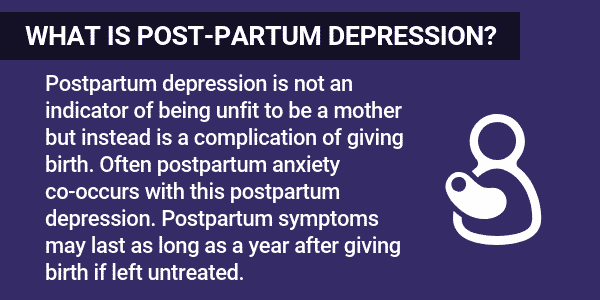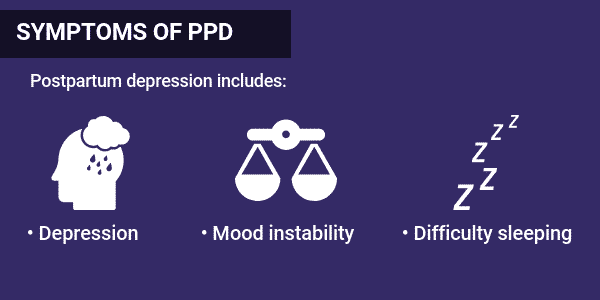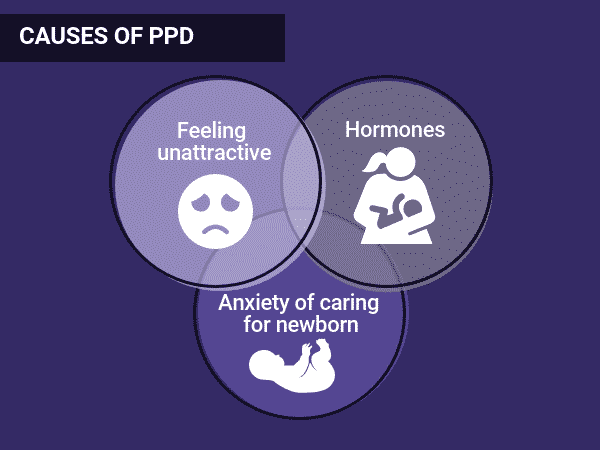Postpartum blues, known as “baby blues,” commonly occurs after a woman gives birth. During this period, feeling anxious and depressed are common.
What Is Postpartum Depression?
Postpartum blues, known as “baby blues,” commonly occurs after a woman gives birth. During this period,feeling anxiousand depressed are common. However, postpartum blues typically lasts no more than two weeks. Postpartum depression, however, is more severe and longer-lasting than postpartum blues are. Postpartum depression is not an indicator of being unfit to be a mother, but it is a complication of giving birth. Often, postpartum anxiety co-occurs with postpartum depression. If left untreated, postpartum symptoms may last as long as a year after giving birth.

Symptoms of Postpartum Depression
Signs of postpartum depression may be easily mistaken for signs of postpartum blues. While both may include a depressed mood, mood instability, crying spells and difficulty sleeping, postpartum depression symptoms are more severe than what a woman may experience with postpartum blues. Some signs and symptoms of postpartum depression are atypical, such as not bonding with the newborn child, suicidal thoughts and thoughts of harming the baby.

Causes of Postpartum Depression
To determine what causes postpartum depression, a person must consider both biological and emotional factors. Hormone levels fluctuate throughout pregnancy and drop almost immediately after giving birth. These hormonal changes may be sufficient causes of postpartum depression. Hormonal changes along with the general anxiety of caring for a newborn, feeling a loss of identity and feeling unattractive may also contribute to the development of postpartum depression.

Postpartum Psychosis
Postpartum psychosis is much rarer than postpartum depression with initial symptoms that are severe. Signs and symptoms may include hallucinations, delusions, paranoia and attempts to harm the baby. After diagnosis, postpartum psychosis treatment needs to begin as quickly as possible to prevent life-threatening behaviors. Initial treatment may include hospitalization, but once acute risks have subsided treatment may consist of a combination of talk therapy and medication. Antipsychotic medications are often used along with antidepressant medications to achieve stability and long-term relief.
Treatment Can Be Life Changing. Reach out today.
Whether you are struggling with addiction, mental health or both, our expert team is here to guide you every step of the way. Don’t wait— reach out today to take the first step toward taking control of your life.
How is Postpartum Depression Diagnosed?
A mental health professional can diagnose postpartum through a clinical interview. Other possible medical causes should be ruled out, such as a thyroid imbalance.

Who is at Risk for Postpartum Depression?
Any woman can develop postpartum depression after birth. Women with a history ofdepressionorbipolar disordermay be more prone to developing postpartum depression. Recent periods of intense stress, inadequate support, financial instability and relationship problems can all increase the probability of postpartum depression developing. If the pregnancy was unwanted or unplanned or there have been some form of difficulties with the pregnancy or birth, feelings of inadequacy may increase, thus raising the probability of postpartum depression developing.
Postpartum Depression Statistics
There is no set guideline of how long postpartum depression lasts. The sooner an individual seekstreatment, the sooner they can recover. Typically, postpartum depression will last for several months, but if left untreated, it may last up to a year and in rare cases, it may last longer.
Some mothers who are experiencingpostpartum depression may turn to substancesto calm and relax the stressful feelings. Beyond having potentially negative effects on the infant, substance abuse can result in an addiction developing. The Recovery Village provides individuals with the tools needed to eliminate their addictions and any co-occurring disorders, such as depression, that caused the initial substance abuse.Call the Recovery Villageand speak to a helpful representative today.









